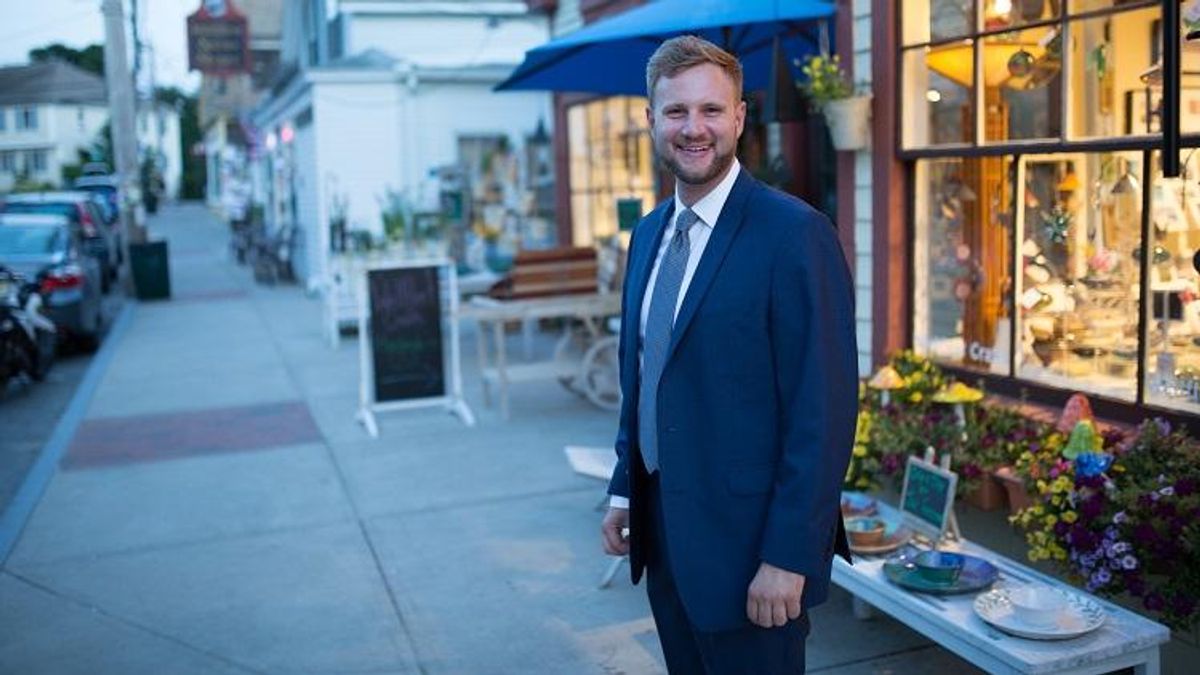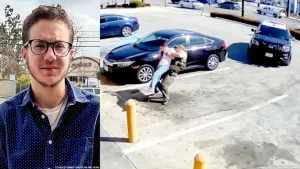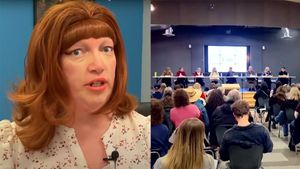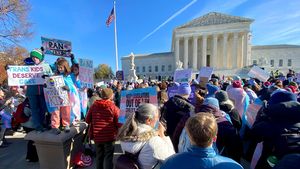The 2016 election was a dark time for most LGBTQ people in America, though there were a few minor victories: Case in point, Julian Cyr, who won a seat in the Massachusetts State Senate, representing Nantucket, Martha's Vineyard, and Cape Cod--including gay oasis, Provincetown. A native of the Cape, State Sen. Cyr, who is seeking re-election next year, is working to ensure that these historically and culturally significant regions remain accessible and that housing there is affordable. Here, he discusses his first year in office, how to battle the opioid crisis, and the best way to get involved in politics.
OUT: What's the most important thing you've learned your first year in office?
Julian Cyr: I think that you can't do it all and that these jobs are so much bigger than you. I'm so dependant on the five people who work for me and the supporters that I have. I kind of was worried about going into this because there's a part of politics that's really dirty. When you're the state senator, you get the attention, you get the status, all this kind of stuff, and I was worried about that. It's an intoxicating part of the job but I've really learned that there's no way that I can do this without a lot of other people.
How do you navigate going into an election in this post-Trump world?
I just try to be real with the issues that people are facing in my communities. Although this environment is so caustic and toxic, nine out of 10 of the issues I deal with as a state senator are not partisan issues. I work with Republicans--I mean, it's Massachusetts so we've got a different breed of Republican--but all of that is reassuring in some way. I think folks are really tuned in. The 2016 election made people feel really woke. I don't have any good answers for how to actively fight the Trump administration, but in the communities I represent, we need you to be involved on the local level. Our representative democracy is only going to work if people are involved on the local level, whether that's serving on our boards of selectmen, planning boards, or health commissions. This is what the Republicans did in the '80s and early '90s in really building a bench. I don't think Democrats and progressive people have done that. We've got to be really engaged and if we're not engaged, we're not going to have a seat at the table.
It seems Democrats and progressives are realizing that local politics is the true way to affect change, almost as if the Trump administration had to happen in order for people to really get involved.
[Laughs] I don't know if it had to happen, but for this whole system to work, people have to participate--and more than once every four years, more than every two years. Especially in the LGBTQ community. I just came from the Victory Institute, which supports LGBTQ candidates, and we had a historic eight trans people across the country elected to office--in the case of Danica Roem, to state office, and in the case of others, to city councils and municipal offices. That's really powerful. We're gonna have a better product and make better decisions with more people who are engaged in that.
What advice do you have for people who want to run?
Running for political office is sort of like professional development and therapy on steroids. You have to acknowledge that it's a really terrifying experience, you're really putting yourself out there and being really vulnerable. For me, I was served really well by not being afraid to lose. That was the best advice I got, actually, from [former Mass. governor] Deval Patrick, whom I had worked for: Don't bet your campaign on what you think you have to do to win because you gotta wake up with yourself everyday. You can't take yourself too seriously in this work. You've gotta have a support network to do these sorts of things. And you have to know in your heart why you're doing this--if it isn't bigger than you, it's not going to sustain you. Your life and your family and your whole existence is interrogated and in this political environment, anything negative about you is going to come out. There's a part of ego in all of this, and that's okay--you gotta have a little bit of that to put yourself out there to do this. But if this is all about you and your ego, it's not going to be enough to sustain you. I think the other important thing is to recognize the structures that dictate who runs and who doesn't run. Good representatives just don't spring fully formed, but are created either by organizations or communities. Some folks think I came out of nowhere, but I worked for Deval Patrick and the Obama campaigns and I had the support of a network. For folks who want to run, those interpersonal relationships are important. You gotta be smart and have some sort of strategy.
What are your top three issues?
I represent Cape Cod, Martha's Vineyard, and Nantucket--these are beautiful places, but they are also places that have become profoundly unaffordable. In Provincetown, a generation ago, you could have moved there and built a life, and now the cost of real estate is really suffocating our communities, so we've got to figure out a way for people to afford to live there. And this is happening in so many desirable places across the country where folks are unable to live. Tied to that, specific to Cape Cod, we have some significant wastewater infrastructure challenges I've been working on. And the opioid epidemic is another piece that disproportionately affects my communities. It's really bad. The county health department looked at the decade from 2004 to 2014 and who's dying from the opioid epidemic; one in four of these people are involved in construction, and 69% of them are people who have a high school diploma or less.
Why is Cape Cod affected so much? You mention construction workers--is it that they injure themselves on the job and they're prescribed these drugs that aren't regulated?
We do a much better job in Massachusetts than a lot of states in limiting access to those initial prescriptions of opioids, but you still have people in those industries who have chronic pain and that's kind of a pathway in. The problem with the opioid epidemic, and this is across the country, is, from the best data we have: It takes seven to nine years to have a successful prolonged recovery from opioid addiction. In Massachusetts, you're guaranteed 14 days of care. That doesn't cut it. In my communities, the last time we experienced an epidemic similar to this was the HIV/AIDS epidemic and what did we do--on the outer Cape and in Provincetown, before the cocktail, we actually had a really innovative approach where we had volunteers and folks kind of taking care of people through the continuum of the disease. We really tried a lot of out-of-the-box, innovative strategies--needle exchanges were one--that made people really uncomfortable, but actually proved to be effective. We need to have that same lens with the opioid epidemic. We're not seeing that and I don't know if we're getting there yet.
And what's your biggest accomplishment?
Cape Cod has an over $4 billion need for wastewater infrastructure. I developed a proposal to establish a Cape Cod Water Protection Trust that would provide a mechanism for the state to kick in over a $1 billion over 30 years. This is a big deal--it is essentially a big property tax relief measure, as without state help, local tax payers are on the hook for the full amount.
What do you think is the biggest challenge facing queer people today in America?
I think we have queer folks in this country who have a tremendous amount of privilege and admittedly at this point I'm in that category--I mean, I'm a state senator--and we have queer folks who have very much been left behind; they tend to be trans folks, queer folks of color. And we need those queer folks who are of privilege to continue to fund the movement, to continue to care about the lived experiences of all LGBTQ people in this country. And that's a really big challenge. Marriage equality resonated directly with everyone but really benefited poorer, queer women across the country--marriage isn't just this elite thing. That being said, how do you take the infrastructure and the movement that was built to get the most remarkable, rapid social change we've seen in our country in a generation, and how do you keep that commitment to working on issues that are a lot more specific, a lot less sexy, that tend to do with equity and justice and fairness for LGBTQ people who are left out? I don't exactly know how to do it. I try to make sure that I find opportunities to talk about that and advance it. At a conference in DC, the head of the National Center for Transgender Equality Mara Keisling was saying that she's been in this movement for like 20 years and she's never been more uncertain of where the movement is going--and I think that's really right. You see tremendous progress in certain areas but if you look at the lived experiences of queer folks in this country, across the board they are worse than their straight peers, especially when you layer on additional identities. As white queer folks, particularly gays and lesbians, come into the fullness of their citizenship, how do you get them committed to using their power? And we have power--significant power. How do you make sure that's tied and connected to very specific policies and movements? I think it remains to be seen if we can do that.
What gives you the most hope?
By and large, most of the people that I interact with, whether at the municipal or state level, are good people who care and are invested in their communities. I see generationally a lot of consensus, especially among millennials, around a whole host of things that have divided the country historically. I think people care about other people. And for better or worse, we have a system of government where people can be a part of that. I think part of the challenge is people don't know how to get involved. And it's really important that we have the political infrastructure to support them. You need those organizations and structures to advance folks. Having spent a year as a legislator, I'm more optimistic than I was in November of 2016. I think people still want to be a part of something that's bigger than them.
To support State Sen. Julian Cyr's re-election campaign, click here.

















































































Sexy MAGA: Viral post saying Republicans 'have two daddies now' gets a rise from the right